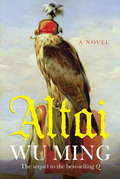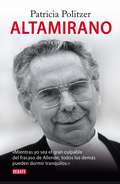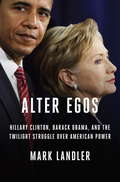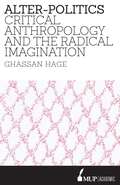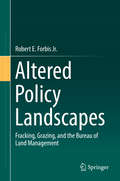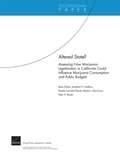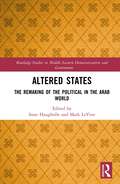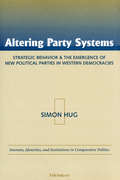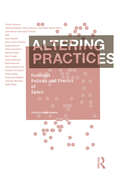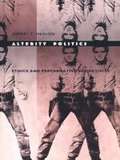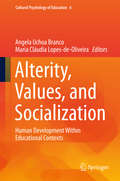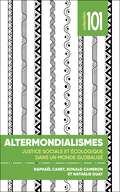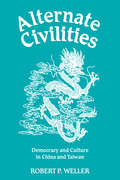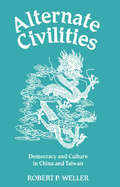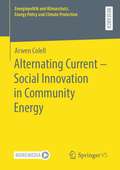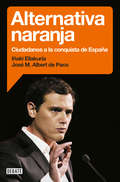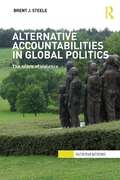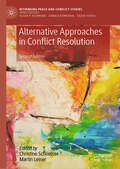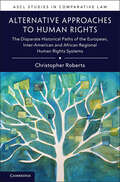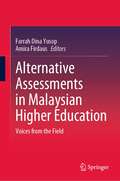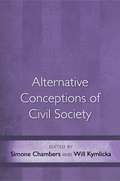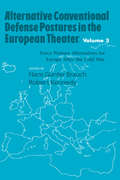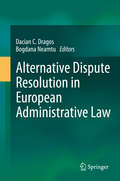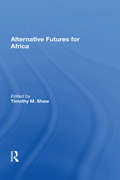- Table View
- List View
Altai
by Shaun Whiteside Wu Ming1569. When a fire breaks out in the Arsenal of venice, everyone suspects Joseph Nasi, number-one enemy of the republic. But it is Emmanuele De Zante, spy catcher and agent, who finds himself in jail accused of treason, having been betrayed by his lover. But who really is De Zante?With an epic, panoramic sweep that reaches across a Europe scarred by war, Altai is a thrilling tale and a coruscating portrait of the divided world in the sixteenth century where the great powers of the Republic of venice and the Ottomans threatened a clash of empires. Through this dramatic landscape, Wu Ming create a powerful narrative of danger, identity and adventure.
Altamirano
by Patricia PolitzerUn libro contundente que revela la vida y obra de Altamirano, uno de los hombres mas poderosos de su tiempo. Uno de los diez hombres más buscados en Chile tras el fatídico golpe militar de 1973 fue Carlos Altamirano Orrego. La «Bestia Negra», como lo llamaban los afines a la dictadura militar, había sido uno de los grandes artífices de la Unidad Popular, tenía una relación íntima con Salvador Allende, era famoso por sus «incendiarios» discursos y en ese tiempo se desempeñaba como secretario general del Partido Socialista. Según los militares, era un peligro para la nación. La destacada periodista Patricia Politzer, en pleno retorno a la democracia, consiguió entrevistarse en París largamente con Carlos Altamirano, para indagar en eso que todos los chilenos se preguntaban: ¿cómo logro escapar de Chile? ¿Cuál era su opinión sobre la lucha armada y el marxismo-leninismo? ¿Cuáles eran los conflictos más íntimos de Salvador Allende? ¿Qué futuro tendría la renovación socialista? A cuarenta años del golpe militar, Altamirano sigue siendo un libro imprescindible para comprender una época y a un personaje esencial para la historia de Chile.
Alter Egos: Hillary Clinton, Barack Obama, and the Twilight Struggle Over American Power
by Mark LandlerThe deeply reported story of two supremely ambitious figures, Barack Obama and Hillary Clinton--archrivals who became partners for a time, trailblazers who share a common sense of their historic destiny but hold very different beliefs about how to project American power In Alter Egos, veteran New York Times White House correspondent Mark Landler takes us inside the fraught and fascinating relationship between Barack Obama and Hillary Clinton--a relationship that has framed the nation's great debates over war and peace for the past eight years.In the annals of American statecraft, theirs was a most unlikely alliance. Clinton, daughter of an anticommunist father, was raised in the Republican suburbs of Chicago in the aftermath of World War II, nourishing an unshakable belief in the United States as a force for good in distant lands. Obama, an itinerant child of the 1970s, was raised by a single mother in Indonesia and Hawaii, suspended between worlds and a witness to the less savory side of Uncle Sam's influence abroad. Clinton and Obama would later come to embody competing visions of America's role in the world: his, restrained, inward-looking, painfully aware of limits; hers, hard-edged, pragmatic, unabashedly old-fashioned. Spanning the arc of Obama's two terms, Alter Egos goes beyond the speeches and press conferences to the Oval Office huddles and South Lawn strolls, where Obama and Clinton pressed their views. It follows their evolution from bitter rivals to wary partners, and then to something resembling rivals again, as Clinton defined herself anew and distanced herself from her old boss. In the process, it counters the narrative that, during her years as secretary of state, there was no daylight between them, that the wounds of the 2008 campaign had been entirely healed. The president and his chief diplomat parted company over some of the biggest issues of the day: how quickly to wind down the wars in Iraq and Afghanistan; whether to arm the rebels in Syria; how to respond to the upheaval in Egypt; and whether to trust the Russians. In Landler's gripping account, we venture inside the Situation Room during the raid on Osama bin Laden's compound, watch Obama and Clinton work in tandem to salvage a conference on climate change in Copenhagen, and uncover the secret history of their nuclear diplomacy with Iran--a story with a host of fresh disclosures. With the grand sweep of history and the pointillist detail of an account based on insider access--the book draws on exclusive interviews with more than one hundred senior administration officials, foreign diplomats, and friends of Obama and Clinton--Mark Landler offers the definitive account of a complex, profoundly important relationship. As Barack Obama prepares to relinquish the presidency, and Hillary Clinton makes perhaps her last bid for it, how both regard American power is a central question of our time. Advance praise for Alter Egos "A superb journalist has brought us a vivid, page-turning, and revelatory account of the relationship between Barack Obama and Hillary Clinton, as well as of their statecraft. Alter Egos will make a signal contribution to the national debate over who should be the next American president."--Michael Beschloss, bestselling author of Presidential Courage "Mark Landler, one of the best reporters working in Washington today, delivers an inside account of Hillary Clinton's relationship with Barack Obama that brims with insight and high-level intrigue. It's both fun to read and eye-opening."--Jane Mayer, bestselling author of Dark Money: The Hidden History of the Billionaires Behind the Rise of the Radical RightFrom the Hardcover edition.
Alter-Politics: Critical Anthropology and the Radical Imagination
by Ghassan HageThis book is a contribution to a long history of critical writing against an increasingly destructive global order marked by an excessive instrumentalisation, exploitation and degradation of the human and non-human environment, and ridden with unacceptable, but also, importantly, avoidable, forms of inequality, injustice and marginalisation.Alter-Politics is concerned with the way anthropological critical writing in particular aims to weave oppositional concerns (anti-politics) with a search for alternatives (alter-politics): alternative economies, alternative modes of inhabiting and relating to the earth, alternative modes of thinking and experiencing otherness.If Alter-Politics privileges alter-politics over oppositional politics, it is not because, as is made clear, the 'alter' moment is more important than the 'anti'. It is because a concern for alter-politics has been less prevalent. The question of 'political passion' is crucial in this conception of the alter-political. For the book argues that it is because radical political passion has been mostly directed towards anti-politics that it has come to dominate over alter-politics. This does not simply mean that political passion needs to be equally directed towards alter-politics. It also means that this passion itself needs to be a radically different kind of political passion once so directed. It is this 'alter-political passion' that Hage strives to create a space for throughout Alter-Politics.
Altered Policy Landscapes: Fracking, Grazing, and the Bureau of Land Management
by Robert E. Forbis Jr.This book documents the United States Bureau of Land Management's (BLM) shift from a rancher-dominated agency to an energy-dominated agency. This shift is analyzed by identifying the conditions under which the expansion of hydraulic fracturing (fracking) in the Rocky Mountain West triggered a political conflict between ranching and energy stakeholder groups. Through scrutiny of federal actions and policies implemented by the Executive Branch between 2004 and 2010, the book sheds light on the emphasis of domestic energy production during this time period, and how the traditional ranching and energy alliance was split by shifting policy interests. The book is meant for policy makers, natural resource agencies, and students and researchers engaged in political science, public administration, and natural resource management. Chapter 1 introduces readers to the case study at hand, and reviews literature on public land agencies and policies. Chapter 2 summarizes the legal history of public land management by the federal government, and the conditions that caused the BLM to favor energy development over ranching in the mid-2000's. Chapter 3 details the role of the Executive Branch (Bush-Cheney administration) in affecting the BLM's domestic energy policies and resource allocation, and chapter 4 analyzes the role of subgovernments in affecting the BLM's motivations too. Chapters 5, 6 and 7 contain first-hand accounts from government officials, state petroleum associations, and ranching supported interest groups to explore the concept of subgovernment stakeholder domination in policymaking, and analyze the similarities and differences between different policy-making elites. Chapter 8 concludes the text by summarizing subgovernment theory, mapping the behaviors of subgovernment actors, and discussing the implications for future political appointees in the direction of land-management agencies like the BLM.
Altered State?
by Peter H. Reuter Robert J. Maccoun Beau Kilmer Rosalie Liccardo Pacula Jonathan P. CaulkinsLegalizing marijuana in California would lead to a major decline in the pretax price, but the price for consumers will depend heavily on taxes, the regulatory regime structure, and how taxes and regulations are enforced. The lower price and nonprice effects will increase consumption, but it is unclear by how much. There is much uncertainty about the effect on public budgets; even minor changes in assumptions lead to major differences in outcomes.
Altered States: The Remaking of the Political in the Arab World (Routledge Studies in Middle Eastern Democratization and Government)
by Sune Haugbolle Mark LeVineBuilding on Timothy Mitchell's seminal 1991 exploration of the "Limits of the State," this book brings together contributions on the state in the Arab world from the past and present in an edited volume. Altered States views the state less as a matter of people and institutions and more as sets of practices, regimes of truth, and capabilities of power, and the effects they have on those under their control. Through analysing case studies - including Tunisia, Syria, Lebanon, Egypt, Palestine, UAE, Rojova, and the Islamic State - the concept of the state is applied and questioned. This book examines the roots of policies that led to the uprisings, focusing on how the "authoritarian bargain", which helped define Arab politics, broke down with the rise of neoliberalism. It also assesses how boundaries between state and society have been redrawn, as various dynamics have brought state forces into more open conflict with citizens and each other. The rapid pace of change in the Arab world has necessitated constant modification of themes and theoretical lens of analysis. This book will, therefore, be of interest to practitioners, graduate students and academics of the Arab world, statehood, and political science.
Altering Party Systems
by Simon HugNew political parties have regularly appeared in developed democracies around the world. In some countries issues focusing on the environment, immigration, economic decline, and regional concerns have been brought to the forefront by new political parties. In other countries these issues have been addressed by established parties, and new issue-driven parties have failed to form. Most current research is unable to explain why under certain circumstances new issues or neglected old ones lead to the formation of new parties. Based on a novel theoretical framework, this study demonstrates the crucial interplay between established parties and possible newcomers to explain the emergence of new political parties. Deriving stable hypotheses from a simple theoretical model, the book proceeds to a study of party formation in twenty-two developed democracies. New or neglected issues still appear as a driving force in explaining the emergence of new parties, but their effect is partially mediated by institutional factors, such as access to the ballot, public support for parties, and the electoral system. The hypotheses in part support existing theoretical work, but in part present new insights. The theoretical model also pinpoints problems of research design that are hardly addressed in the comparative literature on new political parties. These insights from the theoretical model lead to empirical tests that improve on those employed in the literature and allow for a much-enhanced understanding of the formation and the success of new parties. Simon Hug is Lecturer in Political Science, University of Geneva.
Altering Practices: Feminist Politics and Poetics of Space
by Doina PetrescuThis collection of essays addresses and defines the state of contemporary theories and practices of space: it is concerned with the growing importance of technology and communications, the effects of globalization and the change of social demands. Within the current urban and geopolitical contexts, it addresses the emergence of new social and political theories that raise questions of identity and difference in modern society. The book reiterates feminist concerns with space from the critical stance of the new millennium. With contributions from the leading theorists and thinkers from around the world representing the fields of architecture, art, philosophy and gender studies, this book has a truly international and interdisciplinary reach.
Alterity Politics: Ethics and Performative Subjectivity
by Jeffrey NealonIn conventional identity politics subjective differences are understood negatively, as gaps to be overcome, as lacks of sameness, as evidence of failed or incomplete unity. In Alterity Politics Jeffrey T. Nealon argues instead for a concrete and ethical understanding of community, one that requires response, action, and performance instead of passive resentment and unproductive mourning for a whole that cannot be attained.While discussing the work of others who have refused to thematize difference in terms of the possibility or impossibility of sameness--Levinas, Butler, Derrida, Foucault, Deleuze, Guattari, Zizek, Jameson, Heidegger, Bakhtin--Nealon argues that ethics is constituted as inexorable affirmative response to different identities, not through an inability to understand or totalize the other. Alterity Politics combines this theoretical itinerary with crucial discussions of specific and diverse sites of literary and cultural production--the work of William S. Burroughs, Amiri Baraka, Andy Warhol, Ishmael Reed, Rush Limbaugh, and Vincent Van Gogh--along with analyses of the social formation of subjects as found in identity politics, and in multicultural and whiteness studies. In the process, Nealon takes on a wide variety of issues including white male anger, the ethical questions raised by drug addiction, the nature of literary meaning, and the concept of "becoming-black."In seeking to build an ethical structure around poststructuralist discourse and to revitalize the applied use of theoretical concepts to notions of performative identity, Alterity Politics marks a decisive intervention in literary theory, cultural studies, twentieth-century philosophy, and performance studies.
Alterity, Values, and Socialization: Human Development Within Educational Contexts (Cultural Psychology of Education #6)
by Angela Uchoa Branco Maria Cláudia Lopes-de-OliveiraThis book elaborates on issues regarding alterity, values, and human development in different educational contexts, serving from young children to adolescents to adults, and it claims for the need of educational contexts to consider their responsibilities regarding the development of the sociomoral dimension of human beings. The authors, experienced theorists and researchers sharing a cultural psychological perspective, provide a fresh understanding of educational institutions, and elaborate on how initiatives aiming at promoting dialogical practices and ethical orientation within educational contexts can be productive. They provide teachers, researchers, psychologists and parents, as well as the general public, with useful knowledge in order to contribute to theoretical and practical advances concerning education and human development.
Altermondialismes: Justice sociale et écologique dans un monde globalisé
by Raphaël Canet Cameron Ronald Nathalie GuayCritique de la mondialisation promue par le néolibéralisme, le phénomène de l’altermondialisme concerne notre propre contemporanéité. Né au cours de la première décennie du 21e siècle, ce nouveau phénomène mérite l’attention. Ainsi, de la mondialisation à l’altermondialisme, que s’est-il passé ? Altermondialismes répond à cette urgente question en retraçant le parcours de ce phénomène, marqué par de nombreux évènements, de multiples mobilisations, la création de nouveaux réseaux, tel le Forum social mondial, et des revendications ayant émergé dans le sillage de la vague rose en Amérique latine et des Printemps arabes. Mise en perspective historique qui retrace 20 ans de mobilisations sociales dans le contexte de la mondialisation néolibérale et du passage vers l’altermondialisme, l’ouvrage combine l’analyse rigoureuse, l’engagement social, la réflexion et la pratique. Malgré les chocs subis par la crise qui frappe actuellement l’économie mondiale, des mouvements ont trouvé les moyens de relancer les revendications féministes et écologistes, les projets d’économie sociale et solidaire, le respect des droits et la lutte contre le racisme et les discriminations. Dans ce contexte, Altermondialismes pose un regard critique et sans concessions sur le monde contemporain et permet de faire un bilan honnête et sérieux des défis rencontrés, mais aussi des solutions de rechange possibles pour le monde de demain.
Altermondialismes: Justice sociale et écologique dans un monde globalisé (Collection 101)
by Ronald Cameron M Raphaël Canet Mme Nathalie GuayFaced with the impacts that are shaking the planet and its populations, what can we learn from feminist and environmental demands, social and solidarity economy projects, the fight against discrimination and the World Social Forum? The search for alternative solutions is the driving force of social movements. Altermondialismes traces the course of mobilizations that, since the advent of neoliberal globalization, have been working to build a more equitable world.Altermondialismes takes an uncompromising look at the contemporary world and draws an honest and serious assessment of the challenges to be met, but also of the alternatives for the future.Is a better world still possible?
Alternate Civilities: Democracy And Culture In China And Taiwan
by Robert Paul WellerAn anthropologists answer to the argument that Chinas cultural tradition renders it incapable of achieving an open political system, drawing on the example of the role of business organizations, religious groups and womens networks in the democratization of Taiwan.. Alternate Civilities is an anthropologists answer to the argument that Chinas cultural tradition renders it incapable of achieving an open political system. Robert P. Weller draws on his knowledge of both China and Taiwan to show how such sweeping claims fail to take account of potential democratic stimuli among local-level associations such as business organizations, religious groups, environmental movements, and womens networks. These groups were pivotal in Taiwans democratic transition, and they are thriving in the new free space that has opened up in China. They do not promise a clone of Western civil society, but they do show the possibility of an alternate civility }Some Asian political leaders and Western academics have recently claimed that China is unlikely to produce an open political system. This claim rests on the idea that Confucian culture provides an alternative to Western civil values, and that China lacked the democratic traditions and even the horizontal institutions of trust that could build a civil society. An opposed school of thought is far more optimistic about democracy, because it sees market economies of the kind China has begun to foster as pushing inexorably against authoritarian political control and reproducing Western patterns of change. Alternate Civilities argues for a different set of political possibilities. By comparing China with Taiwans new and vibrant democracy, it shows how democracy can grow out of Chinese cultural roots and authoritarian institutions. The business organizations, religious groups, environmental movements, and womens networks it examines do not simply reproduce Western values and institutions. These cases point to the possibility of an alternate civility, neither the stubborn remnant of an ancient authoritarian culture, nor a reflex of market economics. They are instead the active creation of new solutions to the problems of modern life. }
Alternate Civilities: Democracy and Culture in China and Taiwan
by Robert P. WellerSome Asian political leaders and Western academics have recently claimed that China is unlikely to produce an open political system. This claim rests on the idea that ?Confucian cultureOCO provides an alternative to Western civil values, and that China lacked the democratic traditions and even the horizontal institutions of trust that could build a civil society. An opposed school of thought is far more optimistic about democracy, because it sees market economies of the kind China has begun to foster as pushing inexorably against authoritarian political control and reproducing Western patterns of change. "Alternate Civilities" argues for a different set of political possibilities. By comparing China with TaiwanOCOs new and vibrant democracy, it shows how democracy can grow out of Chinese cultural roots and authoritarian institutions. The business organizations, religious groups, environmental movements, and womenOCOs networks it examines do not simply reproduce Western values and institutions. These cases point to the possibility of an alternate civility, neither the stubborn remnant of an ancient authoritarian culture, nor a reflex of market economics. They are instead the active creation of new solutions to the problems of modern life. "
Alternating Current – Social Innovation in Community Energy (Energiepolitik und Klimaschutz. Energy Policy and Climate Protection)
by Arwen ColellCommunity energy projects give their own answers to the challenges of energy system change: They are social innovations. By building new relations between local economies, communities and technical infrastructures, these projects not only change the energy system but also respective power structures. Drawing on case studies from Germany, Denmark and Scotland, this book shows the importance of community ties, and shared symbols for successful processes of transformation and develops recommendations for policy decision-makers.
Alternativa naranja: Ciudadanos a la conquista de España
by Iñaki Ellakuria José María Albert de PacoUna crónica objetiva de los 10 trepidantes años de Ciudadanos. El 8 de junio de 2005, quince intelectuales anunciaron la creación de un partido político como reacción a los efectos del nacionalismo en la vida pública catalana, con el fin de combatirlos frontalmente, sin complejos. Apenas un año después nacía Ciudadanos. Hoy, la criatura que inspiraron los Boadella, España, Ovejero o De Carreras, es una formación vertebral de la política española y su líder, Albert Ribera, se dispone a dar el salto al Congreso de los Diputados de la mano de una propuesta que no es de izquierdas ni de derechas, sino todo lo contrario. Los periodistas Iñaki Ellakuría y José María Alberto de Paco se han zambullido en Ciudadanos para elaborar una crónica que va desde los orígenes de la formación hasta su entrada en el Parlamento. Hablar de partido naranja es hablar de un modelo de éxito. Pero no solo eso: Ciudadanos es también un herviderode contradicciones, amagos de extinción y querellas internas. Ambas caras están contadas en Alternativa naranja, el mejor libro sobre un partido político con mucho futuro.
Alternative Accountabilities in Global Politics: The Scars of Violence (Interventions)
by Brent J. SteeleIn fields such as politics, international relations, public administration and international law, there is a rapidly growing interest in the topic of ‘accountability’. In this innovative new work, Steele shows how we might recognize how an alternative form of accountability in global politics has been present for some time, and that, furthermore, this form’s continued presence remains one of the most politically powerful, if not endurable, possibilities for resistance in the near future. This book argues that the physical and visually shocking outcomes of violence found on the bodies of humans, as well as the buildings and landscapes which surround us, specifically the scars they leave behind, remain one of our most compelling forms of accountability. Steele develops the theoretical argument on scars and exteriority utilizing insights from several philosophical and theoretical resources including Hannah Arendt, Erving Goffmann, and Richard Rorty. The work examines scars and their effects through several illustrations, including the accounts of Emmett Till, Iranian protestor Neda Agha-Soltan, the Syrian boy Hamza al-Khateeb, the massacre in WWII and then memorializing throughout the 20th century of the Lidice children in the modern-day Czech Republic, the particular architecturally destructive outcomes of the 2008-9 Gaza War, the loss of the Twin Towers in New York, as well as a variety of violent scars found on the landscapes of Europe and Southeast Asia. Emphasizing the importance of the space and ‘time’ of scars, the book illustrates how an alternative form of accountability in the scar can be a useful, disruptive, spontaneous, but also creative practice to challenge the discourses of violence which remain with us today.
Alternative Approaches in Conflict Resolution (Rethinking Peace and Conflict Studies)
by Martin Leiner Christine SchliesserIn its second edition, this extended and revised volume brings together alternative and innovative approaches in conflict resolution. With traditional military intervention repeatedly contributing to instability and violence, the study of alternative approaches has become imperative. Can forgiveness help heal relationships in post-apartheid South Africa? How can art assist dealing with ‘unrememberable’ events such as the genocide in Rwanda? What transformational resources do women offer in contexts of massive human rights violations? The aim of this edited volume is twofold: to provide and encourage critical reflection of the approaches presented here and to explore concrete improvements in conflict resolution strategies. In its interdisciplinary and international outlook, this work combines the tried-and-tested approaches from conflict resolution experts in academia, NGOs and civil society, making it an invaluable tool for academics and practitioners alike.
Alternative Approaches to Human Rights: The Disparate Historical Paths of the European, Inter-American and African Regional Human Rights Systems (ASCL Studies in Comparative Law)
by Christopher RobertsThis book explores the comparative historical evolution of the European, Inter-American and African regional human rights systems. The book devotes attention to various factors that have shaped the systems: the different circumstances in which they were founded; the influence of major states and inter-state politics within their respective regions; gradual processes of institutional evolution; and the impact of human rights advocates and claimants. Throughout, the book devotes careful attention to the impact of institutional and procedural choices on the functioning of human rights systems. Overarchingly, the book explores the contextually-generated differences between the three systems, suggesting that human rights practice is less unitary than it might at times appear. Prescriptively, the book proposes that, contrary to the received wisdom in some quarters, the Inter-American system's dual-track approach may provide the most promising model in regards to future human rights system design.
Alternative Assessments in Malaysian Higher Education: Voices from the Field
by Amira Firdaus Farrah Dina YusopThis book offers an overview of five categories of alternative assessments used by established and emerging faculty throughout Malaysian institutions of higher education, namely peer and self-assessment, group-based assessment, performance-based assessment, portfolio, and technology-based assessment. It features 29 innovative case studies of alternative assessments, serving as both inspiration and practical guide for educators planning to design and implement alternative assessments in their own classes. Each chapter showcases viable examples of authentic, holistic, meaningful and effective assessments as practiced by educators in major universities throughout Malaysia. This book also provides readers a greater appreciation of the varied forms of alternative assessments that are possible, limited only by the individual’s innovation and motivation.
Alternative Conceptions of Civil Society (Ethikon Series in Comparative Ethics #1)
by Simone Chambers & Will KymlickaThe idea of civil society has long been central to the Western liberal-democratic tradition, where it has been seen as a crucial site for the development and pursuit of basic liberal values such as individual freedom, social pluralism, and democratic citizenship. This book considers how a host of other ethical traditions define civil society. Unlike most studies of the subject, which focus on a particular region or tradition, it considers a range of ethical traditions rarely addressed in one volume: libertarianism, critical theory, feminism, liberal egalitarianism, natural law, Christianity, Islam, Judaism, and Confucianism. It considers the extent to which these traditions agree or disagree on how to define civil society's limits and how to evaluate its benefits and harms. <P><P>A variety of distinguished advocates and interpreters of these traditions present in-depth explorations of how these various traditions think of ethical pluralism within societies, asking how a society should respond to diversity among its members. Together they produce a work rich with original insights on a wide range of subjects about which little has been written to date. An excellent starting point for a comparative ethics of civil society, this book concludes that while the concept of civil society originated in the liberal tradition, it is quickly becoming an important focus for a truly cross-cultural dialogue. In addition to the editors, the contributors are Michael Banner, Hasan Hanafi, Loren E. Lomasky, Richard Madsen, Michael A. Mosher, Michael Pakaluk, Anne Philips, Adam B. Seligman, Suzanne Last Stone, and Michael Walzer.
Alternative Conventional Defense Postures In The European Theater: Military Alternatives for Europe after the Cold War (Alternative Conventional Defense Postures In The European Theater Ser.)
by Robert Kennedy Hans Günter BrauchFirst published in 1993. Routledge is an imprint of Taylor & Francis, an informa company.
Alternative Dispute Resolution in European Administrative Law
by Dacian C. Dragos Bogdana NeamtuThis book examines the role, the general framework and the empirical effectiveness of the main alternative dispute resolution tools (administrative appeals, mediation, and ombudsman) in administrative matters, within the broader context of the administrative justice system. The book uses approaches from the fields of law, public administration, public policy and political science to assess the importance of different instruments for alternative dispute resolution, with an emphasis on administrative appeals.
Alternative Futures For Africa
by Timothy M. ShawThis comprehensive, critical examination of Africa’s future–written by a diverse group of Africans and Africanists–raises many questions and challenges concerning the development and unity of the African continent. Eclectic in range and method, but cohesive in concern, the book identifies and analyzes alternative probabilities in the political, economic, and social spheres and on the national, regional, and international levels. Many of the contributors point toward an unpromising future for Africa unless its development strategy is changed and its inheritance of dependence on the world system overcome.
